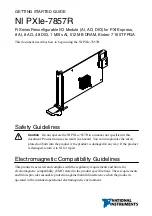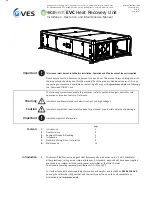
User Guide
TGT. 25.06.2019
Technical
Page 17 of 20
©Copyright by Habegger Maschinenfabrik AG
Version 04 / 25.06.2019
5.3
Pulling and hoisting
-
Check that you have the correct direction of rotation for hoisting and lowering before commencing opera-
tion.
-
If the direction of rotation is incorrect, consult an electrician to check the direction of rotation of the
phases and, if required, to correct them (check any extension cables which may be present).
-
Any extension cables up to 30 m long must have a minimum cross section of 5x2.5 mm
2
.
-
For longer cables, this must be at least 5x4 mm
2.
After inserting the rope, start the motor by pushing the button on the pendant station.
Press the “Raise” button. (see chapter 2)
When hoisting, ensure that neither the housing nor the rope are being diverted or tilted by objects or obstacles. The freely
exiting rope should not be impeded.
-
Keep an eye on the rope during movement.
-
Danger of slipping with small loads!
-
When hoisting to over 50 m, the unloaded rope should not be allowed to freely hang down.
As the special design of the motor does not allow for forced ventilation, long-term use should be interpreted as intermittent
operation with a duty cycle of 30%. When driving longer ropes or for slightly longer duty cycles, the temperature of the mo-
tor should never exceed a value of 80°C.
Never allow the hook to touch the housing.
Stopping the driving wheel:
Release button
In emergencies, e.g. in the case of jams:
Press the “Emergency stop” button. (see chapter 2)
5.4
Lowering
Press the “Lower” button. (see chapter 2)
-
Danger of falling! Pay attention to end of rope! The unloaded rope should slide into the machine freely
and without kinks. Stop lowering at least 2 m before the end of the rope.
-
Danger of burns! The resistor underneath the motor can get very hot during lowering.




































